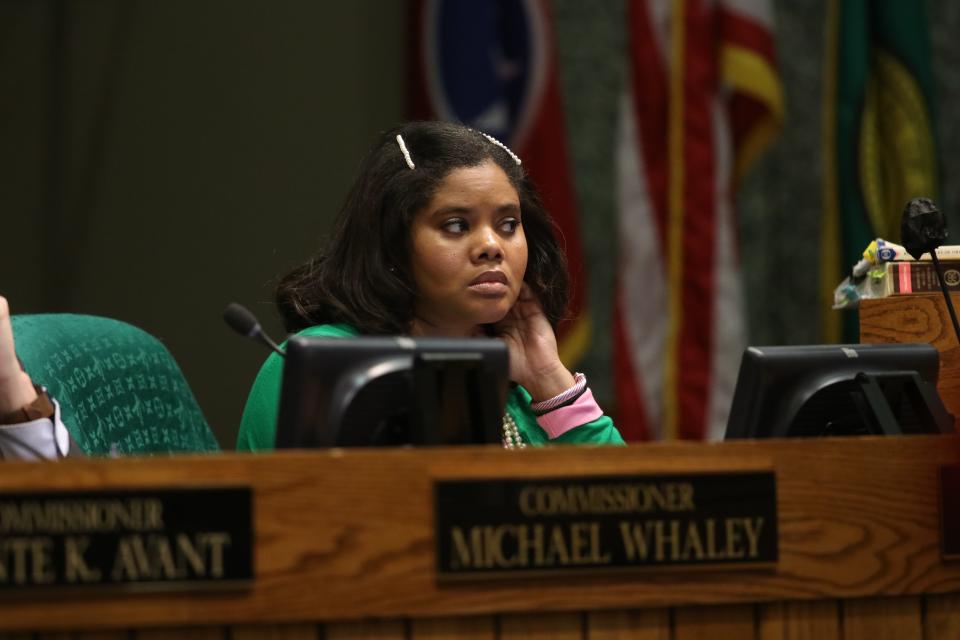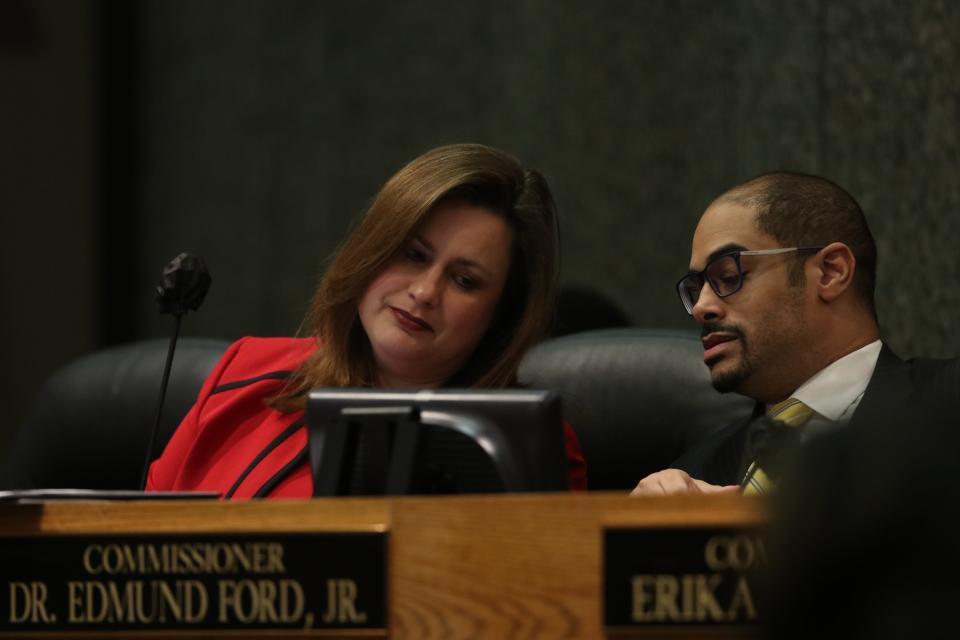Shelby County Commission: new chair named, old fights remain, SCSO debate continues

After only one round of voting, Shelby County Board of Commissioners members elected Commissioner Miska Clay Bibbs to serve as the next chairman of the board Monday.
At a July 17 meeting, commissioners were unable to come to a consensus as three Democrats stymied the voting, refusing to vote for any candidate. Commissioners Edmund Ford Jr., Erika Sugarmon and Britney Thornton all voted pass on each round of votes that meeting, except when they nominated Thornton and voted for her.
There was no debate on the item, but both Clay Bibbs and Commissioner Amber Mills spoke before the initial vote. Mills's speech was about the first vote in July, and the alleged censorship and possible party expulsion surrounding the three Democrats that were alleged to vote alongside the Republicans.
"I would have to say also to the threats of censorship to Democrats on this body that if you do that, don't be a hypocrite," Mills said. "Because you must censor a lot of Democrats."
While Sugarmon and Thronton ended up voting for Clay Bibbs, Ford opted to vote pass. Clay Bibbs was elected with nine votes, all Democrats. Mills only received four from her respective party.

Commissioner Charlie Caswell was elected as vice chair. Commissioners Mick Wright, Caswell and Thornton were all nominated for the post. Ultimately Caswell received the majority of votes after three rounds of voting. Sugarmon, Thornton and Ford all voted for Thornton each round of voting until she was no longer a top two candidate. On the final round of voting, Sugarmon voted for Caswell but Ford and Thornton voted pass.
Recess causes spat between commissioners
During multiple previous meetings, Former Chairman Commissioner Mickell Lowery said that the commission would be recessing every two hours for the sake of staff. Lowery has called a recess at 5 p.m. and 5:30 p.m. at previous meetings, but Ford questioned if the recess was called because of staff, or if it was to put a break in a contentious debate for chairman.
After the vote for both chairman and vice-chair, Lowery said that the commission would enter into a 10-minute recess as it was almost 5 p.m., which Ford questioned. Lowery tried to explain that it was nearing the set time for the recess, announced weeks ago through a memo, but Ford said that during past meetings the recess would start at 5:30 p.m.
"We are in recess," Lowrey then said into his microphone, and Ford replied to Lowery saying he was right. Lowery responded by saying Ford should not speak "out of term," and then shut his own microphone.
Lowery then said he could remove Ford from the meeting with "nine votes" without his microphone on. Ford walked into a backroom after the exchange.

Sheriff's department ordinances moved to next meeting
A resolution that would ban the use of special forces in the Shelby County Sheriff's Office for policing efforts was discussed during the Monday meeting. The resolution, sponsored by Thornton, was passed down with a negative recommendation during committee meetings last Wednesday because of the lack of information provided.
Two ordinances would have altered how the SCSO would be allowed to police by removing specialized units and banning biased traffic stops and the use of pretextual traffic stops for low-level violations, among other things. The third ordinance was regarding the way in which the SCSO collects data.
The ordinance that would remove all specialized was moved to another meeting, but it did not stop some commissioners from speaking against the ordinance altogether.
"I do think we need to hold the police accountable, yes," Caswell said. "But, I think we need to talk about organized crime and these entities that has taken drugs off our street."
A second ordinance barring the SCSO from doing three separate things while policing was moved to a later meeting to allow for Thornton to collect information and data. The ordinance would bar the use of pretextual stops, limit the use of unmarked vehicles and searches and questioning and finally bar surveillance as an alternative to pretextual stops.
More commission news: Shelby County Commissioners scoff at additional funding for County Clerk audit
The third ordinance would make SCSO compile data related to traffic stops, arrests, use of force and citizens’ complaints against law enforcement officers in a certain manner. Commissioner Michael Whaley spoke in support of the ordinance, saying that transparency for SCSO would transcend the current commission's governance.
"This is something that, if done properly, can outlast our term on the commission and be something that becomes a part of a culture of government which is transparency, data collection, reporting and accountability," Whaley said.
Whaley moved the ordinance to the next meeting as well.
Brooke Muckerman covers Shelby County Government for The Commercial Appeal. She can be reached at Brooke.Muckerman@commercialappeal.com and followed on Twitter @BrookeMuckerman.
This article originally appeared on Memphis Commercial Appeal: Shelby County Commission names new chair, continues policing debate

